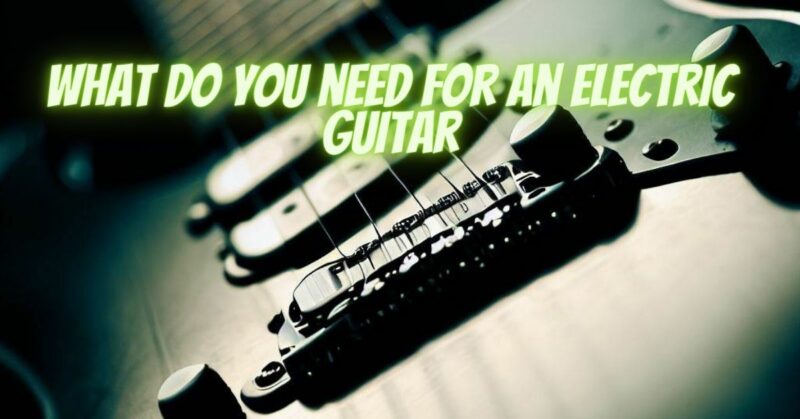Playing the electric guitar requires a few essential items beyond the guitar itself to ensure an optimal playing experience and sound production. In this article, we will explore the necessary equipment for electric guitar players, discussing items ranging from the basic essentials to optional accessories that can enhance your playing and performance.
- Electric Guitar: The first and most obvious requirement is an electric guitar. Choose a guitar that suits your playing style, tonal preferences, and fits comfortably in your hands. Consider factors such as the guitar’s body shape, neck profile, pickups, and overall construction to find a guitar that resonates with your musical goals.
- Amplifier: An amplifier is essential for amplifying the sound of the electric guitar. It takes the electrical signals from the guitar’s pickups and increases their volume, while also shaping the tone. Select an amplifier that matches your playing style and desired sound characteristics. Consider factors such as wattage, speaker configuration, and built-in effects when choosing an amplifier.
- Cables: Cables are necessary for connecting your electric guitar to the amplifier or other audio equipment. Invest in high-quality instrument cables to ensure reliable signal transmission and minimize unwanted noise or interference. Consider the length of the cables based on your performance needs, whether it’s for home practice or live performances.
- Picks: Picks, also known as plectrums, are small triangular or teardrop-shaped accessories used for plucking or strumming the guitar strings. They come in various thicknesses and materials, allowing you to achieve different tones and playing styles. Experiment with different picks to find the ones that suit your preferences and playing technique.
- Strings: Strings are crucial for producing sound on the electric guitar. Regularly check and change your guitar strings to maintain optimal tone and playability. Choose strings that suit your playing style and tonal preferences, considering factors such as gauge (thickness) and material (such as nickel or stainless steel).
- Guitar Strap: A guitar strap helps support the weight of the guitar and allows you to play standing up. It provides comfort and stability during performances. Choose a strap that is adjustable, durable, and fits your personal style and preference.
- Tuner: A guitar tuner is an essential tool for ensuring your guitar is in tune. It helps you accurately adjust the pitch of each string to the desired notes. Tuners come in various forms, including clip-on tuners, pedal tuners, or smartphone apps. Select a tuner that is easy to use and provides accurate tuning results.
Optional Accessories:
- Effects Pedals: Effects pedals offer a range of tonal possibilities, allowing you to shape and modify your guitar’s sound. From overdrive and distortion to delay, modulation, and reverb, effects pedals can enhance your playing and provide creative sonic exploration. Experiment with different pedals to discover the ones that suit your musical style.
- Guitar Stand or Case: A guitar stand or case is essential for safely storing and displaying your instrument when not in use. It helps protect the guitar from damage, such as falls, scratches, or exposure to environmental elements. Choose a stand or case that provides proper support and safeguards your guitar during transport or storage.
- Maintenance Tools: To keep your electric guitar in optimal condition, consider investing in maintenance tools such as a cleaning cloth, guitar polish, fretboard cleaner, and a truss rod adjustment tool. These tools help you maintain the instrument’s cleanliness, playability, and longevity.
Conclusion:
To embark on your electric guitar journey, you need the instrument itself, an amplifier, cables, picks, strings, a guitar strap, and a tuner. These items form the core essentials for electric guitar players. Optional accessories, such as effects pedals, a guitar stand or case, and maintenance tools, can enhance your playing experience, provide additional tonal options, and ensure the longevity of your instrument. Remember to personalize your equipment choices based on your playing style, preferences, and musical goals. With the right equipment and accessories, you’ll be well-equipped to explore the sonic possibilities and express your musical creativity on the electric guitar.


